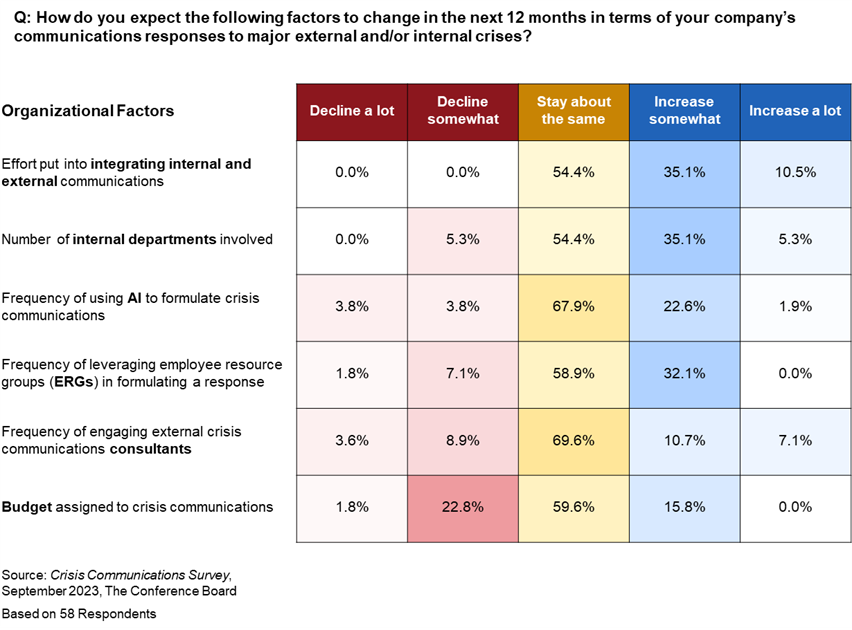As the conflict in the Middle East deepens, discussions among communications specialists on how to deal with the crisis have intensified.
Since the initial events that triggered the conflict, Members of The Conference Board Communications Councils have highlighted the importance of revisiting, reviewing, and revising the way companies and their leaders comment (or remain silent) on this unfolding crisis.
This need is underscored by data we collected in September from communications leaders, who told us what they expected might change about how organizations react to future crises. And then this next crisis arose.

There are rising expectations for the involvement of employee resource groups (ERGs) and other departments. And note the expectations of AI, with almost a quarter of respondents intending to increase its use.
This comes into play as we consider the responses companies are taking to the latest news from the Middle East.
- Some companies are still discussing whether to comment on this issue—even internally (although most companies have communicated something internally, even if they have no operations in the region). Concern is expressed for people, knowing some employees are likely to have connections to the region through friends or family. There is less interest at this point in external communications for most companies.
- Language matters—a lot. Choosing your words carefully in this emotional setting is a must, and despite all the care, your communications can still backfire. Is it a war, or a conflict? Is it Israel-Hamas or Hamas-Israel? Or is it the Middle East? The consensus seems to be that no matter what or how you say something, some people will be disgruntled. Therefore, the conclusion seems to be that it's best to be precise but as neutral as possible as you describe your corporate reaction to the situation. Special care is needed when communicating to a global audience as English words may be translated quite differently from your intended meaning.
- Companies need to be aware of overcommunicating, which can be seen as defensive when you are pushed to clarify what you've previously said. Once you have stated your thoughts, feelings, and actions, it seems best to let your communications stand—assuming you made the choices deliberately, using the best available information at the time. Input from employees via ERGs or other groups is valuable. A good rule of thumb seems to be to avoid further communication unless you have something different, specific, and useful to add.
- There doesn't seem to be a lot of scenario planning going on as to what might be coming next. It seems the situation is just too fluid to get into in-depth discussion at this point. Companies are drawing up lists of questions/considerations that they could or should be addressing now, with the understanding that the situation is fast moving.
The Conference Board remains a useful resource to keep you updated on the geopolitical developments of the conflict, the economic repercussions, and the insights that communications teams can use to craft their approaches
As the conflict in the Middle East deepens, discussions among communications specialists on how to deal with the crisis have intensified.
Since the initial events that triggered the conflict, Members of The Conference Board Communications Councils have highlighted the importance of revisiting, reviewing, and revising the way companies and their leaders comment (or remain silent) on this unfolding crisis.
This need is underscored by data we collected in September from communications leaders, who told us what they expected might change about how organizations react to future crises. And then this next crisis arose.

There are rising expectations for the involvement of employee resource groups (ERGs) and other departments. And note the expectations of AI, with almost a quarter of respondents intending to increase its use.
This comes into play as we consider the responses companies are taking to the latest news from the Middle East.
- Some companies are still discussing whether to comment on this issue—even internally (although most companies have communicated something internally, even if they have no operations in the region). Concern is expressed for people, knowing some employees are likely to have connections to the region through friends or family. There is less interest at this point in external communications for most companies.
- Language matters—a lot. Choosing your words carefully in this emotional setting is a must, and despite all the care, your communications can still backfire. Is it a war, or a conflict? Is it Israel-Hamas or Hamas-Israel? Or is it the Middle East? The consensus seems to be that no matter what or how you say something, some people will be disgruntled. Therefore, the conclusion seems to be that it's best to be precise but as neutral as possible as you describe your corporate reaction to the situation. Special care is needed when communicating to a global audience as English words may be translated quite differently from your intended meaning.
- Companies need to be aware of overcommunicating, which can be seen as defensive when you are pushed to clarify what you've previously said. Once you have stated your thoughts, feelings, and actions, it seems best to let your communications stand—assuming you made the choices deliberately, using the best available information at the time. Input from employees via ERGs or other groups is valuable. A good rule of thumb seems to be to avoid further communication unless you have something different, specific, and useful to add.
- There doesn't seem to be a lot of scenario planning going on as to what might be coming next. It seems the situation is just too fluid to get into in-depth discussion at this point. Companies are drawing up lists of questions/considerations that they could or should be addressing now, with the understanding that the situation is fast moving.
The Conference Board remains a useful resource to keep you updated on the geopolitical developments of the conflict, the economic repercussions, and the insights that communications teams can use to craft their approaches


